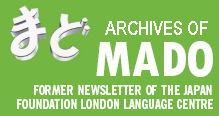One year ago, Wren Academy, a London secondary school, attended the Japan Foundation's Head Start Course. Now, Japanese language classes are thriving at the school. Please see below for an interview with Jamie Barnes, Head of Modern Foreign Languages at Wren Academy.
Please tell us about yourself.
My name is Jamie Barnes. I am Head of Modern Foreign Languages at Wren Academy, a brand new Academy in North Finchley. Wren opened its doors to our first intake of students in September 2008. In my role as Head of Faculty, I have also been studying Japanese in classes with the students, as it is part of the Academy vision that staff should be seen as life-long learners.
Did your school teach any Japanese classes before Head Start 2008?
Obviously, as a new school, we were building a language faculty from scratch. Nevertheless, we were committed to offering Japanese learning to our students from a very early stage as it would build wider social cohesion of the Academy with a large Japanese community nearby.
What did you gain from Head Start 2008?
As I was not yet in post, another member of the Academy attended the Head Start course, who made the following comments:
"I found the day very informative and of real benefit in helping us start Japanese from scratch. The advice from schools which already offer Japanese was invaluable and inspired me to integrate Japanese into the curriculum at Wren and give our students the opportunity to gain qualifications in due course. The sample Japanese lesson was very interesting and the food was very much appreciated."
What is the current situation regarding Japanese at your school?
At Wren Academy, all students take part in three hours of enrichment activities every week. Japanese is available as part of our enrichment programme and at a weekly Japanese breakfast club. We currently have 40 year 7 students studying Japanese once a week (two groups of 20).
What have they been studying?
The students (and myself) have studied a wide range of topics, and can recognise the Japanese words for numbers, countries, nationalities, colours, animals, adjectives and much more. Further to this we have been learning to write Hiragana and basic Kanji. Although we still have some way to go before we can write freely, we are getting quicker and more accurate in our Japanese writing.
Do your students sit any exams?
As we are in our first year, we are not planning to enter any students for exams this year. Nevertheless, we are currently looking into a number of Japanese qualifications, including Asset languages and GCSEs, and look forward to students' future successes in these qualifications.
What do your students enjoy most about Japanese classes?
Students have responded exceptionally well to the challenge of learning a new language. As an Academy, we have trained students about how to become effective learners, and they regularly demonstrate this in Japanese class by sticking at their learning, and by working together. We were keen that our Japanese provision would widen our students' horizons, and therefore students have also studied aspects of Japanese culture. Origami, sumo wrestling, manga and sushi have really captured our students' imagination.
How did you find a Japanese teacher?
We advertised on the Japan Foundation London Language Centre website.
How does your teacher find resources?
Our Japanese teacher finds most of her resources from the Japan Foundation library. In particular, she uses websites such as Minna no Kyozai as suggested by the Japan Foundation. She also finds the 'JLE-UK' email discussion group valuable.
Have you had any difficulties introducing Japanese?
We have not experienced major difficulties but clearly we are keen to build on the success of our first year. We are currently looking at how we can increase teaching time, and work towards a specific qualification, which will accelerate our students' language learning.
Do you have any advice for other schools that are thinking about introducing Japanese?
I believe that the key to our success this year has been the formalised contact time built into our enrichment programme. Motivating students is obviously key to their success, so we seek to engage them with ranging activities and a broader study of Japanese culture. Our Japanese teacher and I have also visited a nearby school, where Japanese is taught very successfully, to pick up ideas on how to develop our programme. We plan to make further visits throughout this year.
If you would like more information about the Japan Foundation's 2009 Head Start Course, please contact Christopher Shone on 020 7436 6698 or send an e-mail to info.language@jpf.org.uk
|




 Japanese Language Navigation
Japanese Language Navigation
